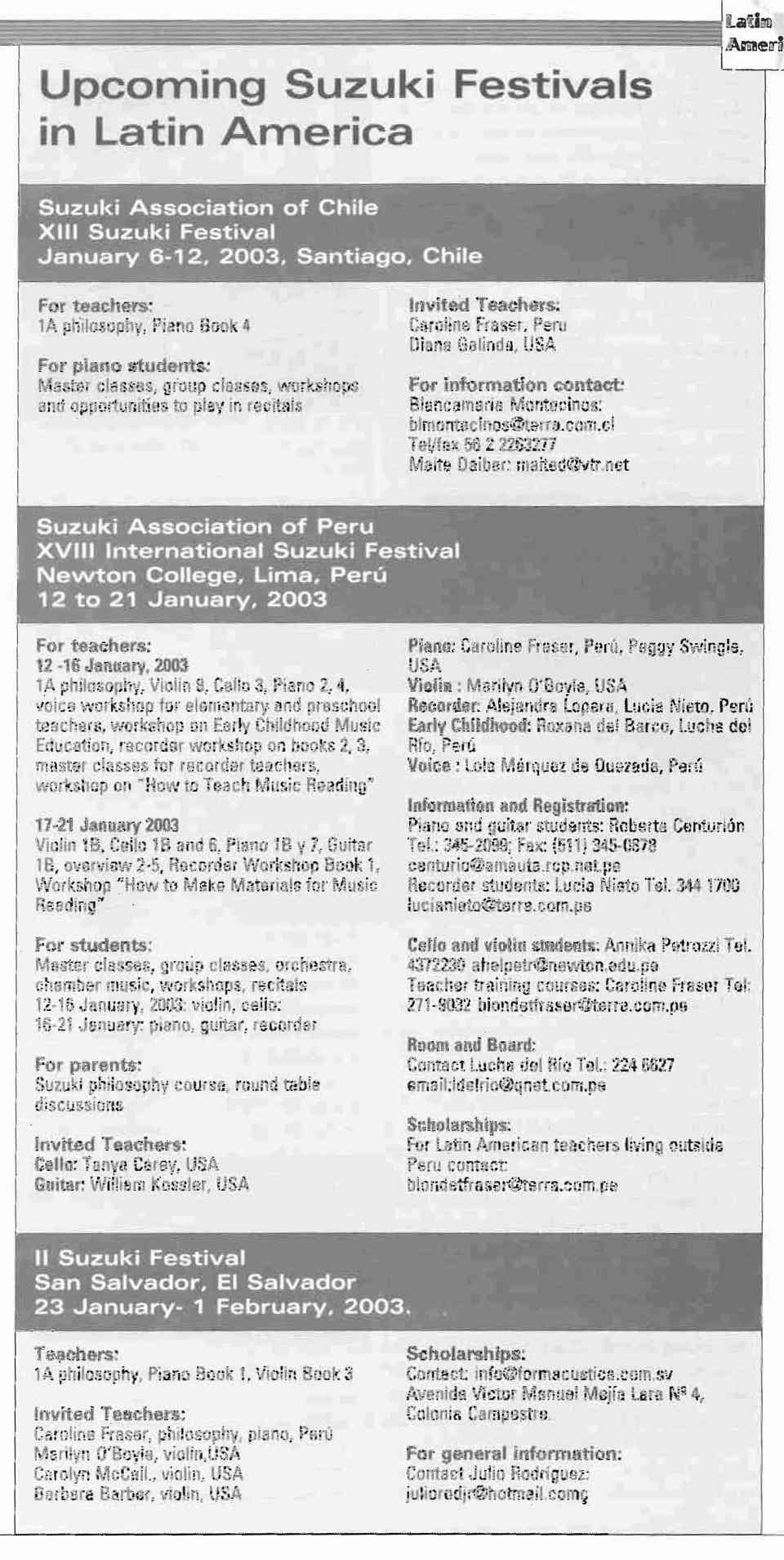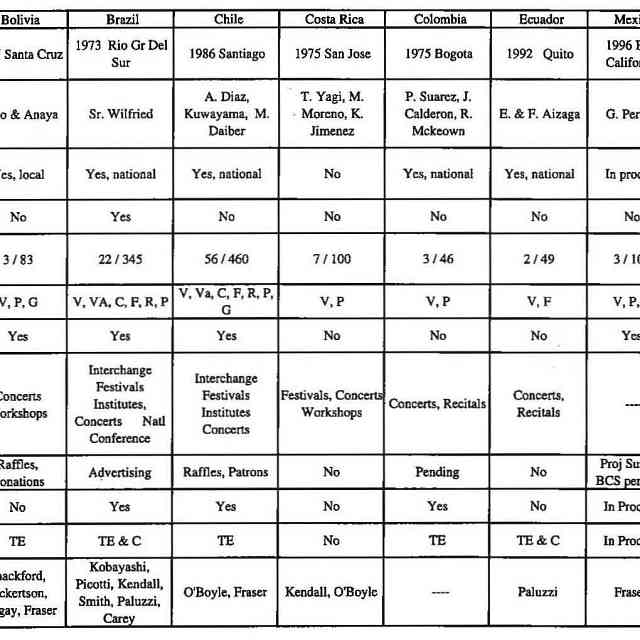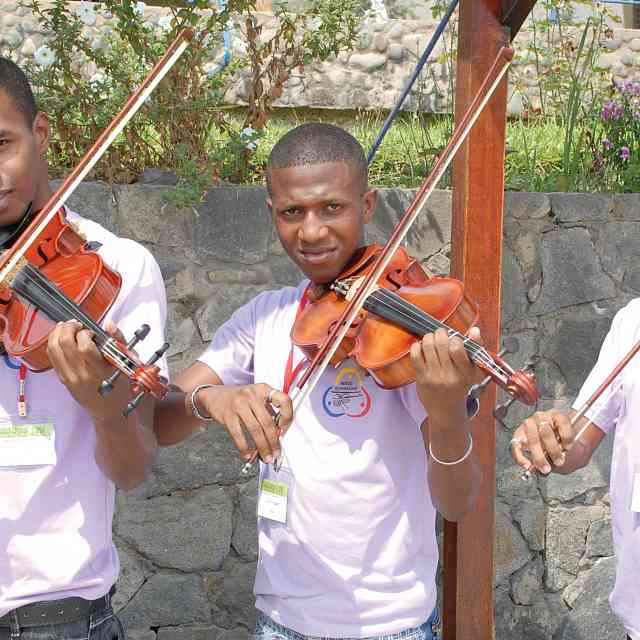Caroline Fraser and Roberta Centurion, translators
Despite the economic crisis which Latin America is experiencing, Suzuki programs continue to grow and flourish. Due to this crisis many places have had to cancel plans for offering teacher training courses, while other courses have miraculously taken place. Below you will hear from teachers in Bogota, Colombia; Londrina, Brazil; Cusco, Peru; and Cordoba, Argentina. Congratulations to all the teachers, their families and the people in their communities who have worked with dedication and persistence to help spread Dr Suzuki’s ideals in Latin America.
IV Festival Suzuki de Colombia
A dedicated group of teachers in Colombia worked together to ensure the success of the IV Suzuki Festival of Colombia which took place from June 23rd through July 7th I taught a philosophy course to nineteen enthusiastic participants of all instruments. Then followed a Piano Book One course with fourteen teachers participating, three of whom were guitarists who had hoped to have been able to attend a guitar course. (Unfortunately it was not possible to offer guitar this year for economic reasons). Thanks to already established Suzuki piano programs, I had a wonderful group of piano students for demonstration classes. Marilyn O’Boyle taught a Book Three Violin course to a grand total of 27 teachers and gave master classes to forty students.
I was delighted to learn that three of the young piano teachers, Pilar Sarmiento, Dilva Sanchez and Diana Albanches, have opened the first Suzuki Piano School in Bogota this year. The school is called Ars Ludere! Also two string teachers, Andres Murillo and his brother Juan Pablo Murillo, have opened their own Suzuki School by the name of A la cuerda. These teachers have taken Suzuki training courses in Colombia and have also traveled to participate in the Festival in Lima, Peru. As a direct result of the training that has been offered in Colombia over the past four years, Ernesto Diaz, Director of the Youth Symphony Orchestra of Colombia Foundation, is now organizing courses for his teachers.
Report from Marcelino Prats, Vice President of the Suzuki Association of Colombia
In this 4th Suzuki Festival in Colombia, we had the support of a group of teachers who had already attended festivals and who are professionally active in the Suzuki movement. The result of this is that each year we reach a deeper understanding of the possibilities offered by the Suzuki Method as there is a higher level of commitment, and a more profound understanding in our daily life.
Because there already existed a nucleus of people known for their work in the Suzuki Method, the new participants came with a special interest in learning. It was amazing to see the quantity and the quality of the new teachers who were taking part in the course for the first time. It is very likely that many of them will become a part of the Suzuki movement and will make it possible for many more children to be able to study music in an efficient and, more importantly, a harmonious environment. It was also interesting to see the parents’ participation this year in the two Parents Round Table discussions, which opened up new possibilities in their interactions with their children.
I think that the general pedagogical elements Dr Suzuki adapted to the teaching of music were of the utmost importance. We can no longer teach children the way they were taught in the past; not in schools nor in the home. In music education we are also working with human beings who in general need to learn in a “not authoritative or permissive” way. The Suzuki method is an efficient method, a process, and at the same time that the method trains a specific skill, that skill is being integrated into the child’s whole being.
We are therefore forming people who have received love, and who have developed self esteem by way of this learning process, which in turn helps them become better trained, more complete, and more human in the best sense of the word. At this time in Colombia we greatly value this contribution. Many thanks to our teachers Marilyn O’Boyle and Caroline Fraser for the seeds of harmony which they have sown, given that today we need that more than ever.
Comments from Pedro Suarez, President of the Suzuki Association of Colombia
We must acknowledge the hospitality and attention to detail that the teachers and authorities of Suzuki institutes in the United States and in Peru have offered the Colombian teachers and students. This promotes a high level of understanding and implementation of the Suzuki Method in our country and opens up possibilities for growing artistically and for participating in the kind of organization which the festivals in the United States and Peru offer. We hope to continue working with teacher trainers such as Caroline Fraser, Marilyn O’Boyle and Tanya Carey. In addition we would like to be able to invite teacher trainers in guitar and flute.
22nd Festival of Music, Londrina, Brazil
Report by Carol Cross
This summer I had the honor of being the first Suzuki Piano Teacher Trainer to teach at the 22nd Festival of Music held annually in Londrina, Brazil. All of the students (I had seven teachers in IB and three in Book Two, plus about seven children altogether) were seriously interested and worked very hard during the two weeks. I had a great translator-not a musician, but with a quiet and supportive manner that I much appreciated. I enjoyed learning (and using!) a few key phrases-like “pronto…ja!” (ready-go!). And every day brought a surprise-including the day of departure, on which the airport closed because of rain, so I got home a day later than planned. Most surprises were pleasant, however, but it underscored the need to be flexible at all times!
To say it was a rich experience is an understatement. The Suzuki courses (Grace Field, cello, and Linda Judiesch, violin were there for the 2nd year) were just a small component of a much larger festival which offered classes in everything from the History of Rock and Roll to jazz improvisation to recorder. There were 1,200 students and 75 faculty from all over, including a woodwind quintet from Brussels. Every day there were six hours of classes and then two or more concerts presented by the visiting faculty or students. Besides my wonderful students, I especially enjoyed the opportunity to meet and share ideas about music and teaching with dedicated professionals who are working in all sorts of situations. It is a calling that transcends language and culture and truly connects us as humans worldwide.
Everyone I met-from Sister Sandra Regina, in whose convent school we taught, to Dr. Nortin Morozowicz, the artistic director of the Festival-taught me lessons in hospitality. I would especially like to thank Shinobu Saito, Suzuki violin teacher from Campinas, who worked so hard both behind and on the scene facilitating the growth of Suzuki programs in Londrina. She and so many others made my time in Brazil an experience I’ll always remember.
Suzuki Festival in Cusco
Report by Flor Canalo
With great joy, seven teachers and the secretary of the Cultural Association Quantu, branch of the Suzuki Association of Peru in Cusco, greeted our dear friend and teacher trainer Caroline Fraser on the week of August 7-11 of this year, for a lA Suzuki Philosophy Course and a small Festival for nearly 100 recorder, guitar, violin and piano students ranging in ages from 3 to 18 years old.
We have been teaching with the Suzuki Method for six years. We are the pioneers of the method in Cusco. In 1996 we organized the first Philosophy Course with Roberta Centurion and since that time we have attended the Suzuki Festivals in Lima to continue our training. We have worked continuously during the past six years to apply Suzuki’s method in our teaching. As part of this work, we have given many concerts, generating interest from the general public, thanks to the results we have attained.
We had prepared for this event for months, personally extending invitations to all the people that we thought would be interested in this training course. We had incredible results! Sixty-five people registered for the course and five more opted to attend as observers. Of this number 80% were teachers, musicians or music students, many of whom were attending the Superior Institute of Music Leandro Alvina Miranda, others were members of the National Police Band and a group of eleven young people were advanced Suzuki students from Cusco. Also participating were teachers of primary, early childhood, special education and art teachers as well as actors. They all displayed great interest in applying the principles of the Suzuki Philosophy to public school education and/ or artistic education of their children.
The course was given in the Superior Institute of Music Leandro Alvina Miranda, thanks to the generosity of its director, Abel Rozas Aragon. Caroline’s classes were excellent, very didactic and motivating. Here are some commentaries:
“Having the chance to know the life and work of Suzuki enables one to understand the workings of the philosophy of love. To teach with love is to create a society of the future with values. “
-Alberto Cavassa, Suzuki guitar student from Cusco
“This course is important because it teaches us to teach better; that is to say it prepares us to shape a new vision of education where learning can be beautiful, without generating traumas or frustrations. The conclusion of the class is to teach with love. “
-Luis Fernando Prudencia, violin student, Superior Institute of Music Leandro Alvina Miranda.
The afternoons were dedicated to master classes for children studying piano and violin taught by Caroline, group classes for piano taught by Flor Canelo with the assistance of Arioska Falconi and group classes for violin taught by Kike Pinto and Amy Tai. The 70 participants observed these classes. Each evening during the first three days of the festival there were solo recitals for all the students of the following teachers: recorder, Madeleine Oroz; guitar; Ytala Flores and Jimmy Zamallos, violin; Kike Pinto and Amy Tai; and piano, Flor Canelo and Arioska Falconi.
The student festival ended on Saturday, August 10, with a Suzuki Method Concert in the Municipal Theater, performing to a packed house. Approximately 100 children from 2 to 18 years in age participated in the concert. Pianists, violinists, guitarists, recorder players and children in the Early Childhood Music program played instruments and sang with the chorus and orchestras. The culminating moment of the concert was when Caroline made a presentation of an eighth-size cello, donated by Carol Tarr by way of the Suzuki Association of the Americas to begin a cello program in Cusco. Carol Tarr visited us in Cusco and attended a concert we presented in December 2001. We are deeply grateful for Carol’s help in enabling us to realize our dream of starting a cello program.
The following is a commentary of our Final Concert that appeared in the Cusco Weekly newspaper:
” … After the Choir sang, to our great surprise, children from 3lf2years to teenagers came on stage playing together, from humble recorders to guitars, piano and violins. The teachers stayed at the edge of the stage and once in a while entered to direct or accompany the children. The evening was definitely a spectacle of talent of these young musicians. Virtually all the pieces were flawless. The concentration and the joy that the children exuded were without a doubt more than sufficient for the parents and teachers. The evening was very pleasant, and the music at times seemed to be performed by professionals with years of experience. .. .” “. .. The Suzuki Method may not be well known, but on the basis of last Saturday’s concert, I think that its success is definitely established. “
After the festival we all got together at the house of one of the participants for a delicious wayta (potato baked in the earth). We are very grateful for this course and festival that motivates us to continue to work with the Suzuki Method with much love.
Round table discussion for Parents On the last day of the festival, a roundtable discussion for parents, teachers and participants led by Kike Pinto and Amy Tai focused on the importance of the role that parents play in the Suzuki Method.
Comments from Kike Pinto: In various International Suzuki festivals which we have attended in Lima, we have participated in round table discussions for parents in which parents and Suzuki teachers exchanged experiences, doubts, questions, ideas and feelings about our children and their involvement with the Suzuki Method. In the recent festival in Cusco we also had this kind of discussion session. But this time in addition to the parents and experienced teachers, we included the teacher trainees and the advanced Suzuki students. This was a very interesting experience. The teacher trainees greatly benefited from hearing the experiences of parents and students who had been involved in the Suzuki Method for a long time. For the advanced students it was enriching to participate in this kind of discussion for the first time, where very often people were speaking about them, but they themselves had seldom heard these points of view. Of course, for the parents and the Suzuki teachers it was very interesting to hear what the students had to say, and students felt that they were helping to contribute through their own experiences towards a better understanding on the part of the teachers in training.
3rd Guitar Festival for Children, Cordoba, Argentina
Report from Pablo Bellavia
The 3rd Guitar Festival for Children which 1 organized in September was a great success. A total of 40 students between the ages of 4 and 16 attended. We heard students play repertoire from Books One through Four, and in addition there were more advanced students for whom 1 had put together different material so that they could continue to make progress on their instrument.
Diana Chagali’s students also participated. Diana is from the city of La Plata and had attended the Festival in Peru this past January where she studied Book Two with Mr. Kossler. She brought me some material including Book Five, which 1 so desperately needed and also some music for ensembles.
Students from the Suzuki Group of El Rosario also attended, under the direction of their teacher Silvia Castanos. It was a surprise for me to see such young children (seven and eight years old) playing Book Three pieces! Silvia is also interested in taking Suzuki training. We had two marvelous days sharing music and the teachers also had the opportunity to get together and share experiences, material, and personal anecdotes.









